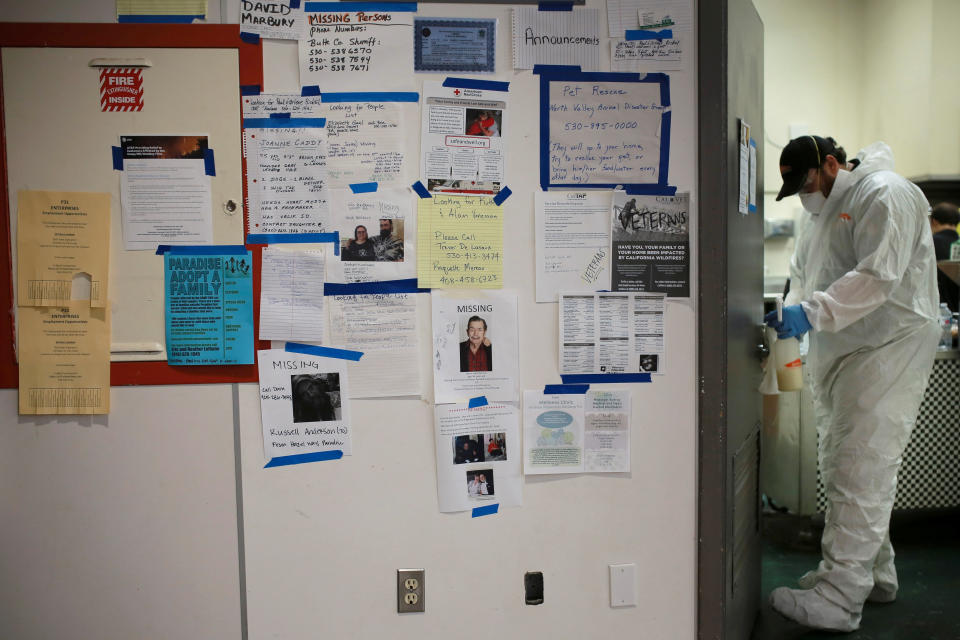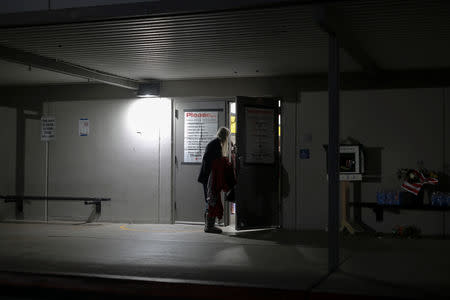California wildfire evacuees prepare their tents for rains
By Elijah Nouvelage
CHICO, Calif. (Reuters) - Heavy rains due on Wednesday in northern California are expected to hinder search teams sifting through ash and rubble for the remains of victims of the deadliest wildfire in the state's history, while inflicting misery on evacuees camped out in tents.
Up to nearly eight inches (20 cm) of rain is forecast to fall by Friday in areas around the town of Paradise, the community of nearly 27,000 people 175 miles (280 kilometers) northeast of San Francisco that was largely incinerated by the Camp Fire. The blaze killed at least 81 people and hundreds are still missing.
While the storm will help firefighters still battling the fire, it will mean more suffering for many residents left homeless by the disaster. Some of the homeless, whose numbers have not been determined, are camping out in parking lots rather than staying in emergency shelters.
Kelly Boyer, who lost his home in Paradise, has been sharing a tent with a friend at an encampment outside a Walmart store in nearby Chico, where overnight low temperatures have fallen to just above freezing.
Boyer has received wooden pallets and plastic tarps donated by local residents to keep his tent off the ground and dry, but he said the rain would still make a mess. "It's going to be mud city," he told Reuters.
Forecasters said the rains, which in some areas are likely to be accompanied by winds of up to 45 miles per hour (72 kph), might cause rivers of mud and debris to slide down flame-scorched slopes stripped of vegetation. The fire has burned across 153,000 acres (62,000 hectares) of the Sierra foothills.
Mass evacuations since the fire erupted on Nov. 8 have removed most people from harm's way of any debris flow, according to National Weather Service (NWS) hydrologist Cindy Matthews. The volcanic soil and relatively shallow slopes in the fire zone mean the ground is unlikely to become saturated enough for hillsides to give way to landslides, she said.
But in Southern California authorities warned residents in areas burned by wildfires in the foothills and mountains northwest of Los Angeles of mud-flow hazards from rain this week. One of those blazes, the Woolsey Fire, killed three people.
Evacuees also face increasingly chilly weather.
Authorities in Butte County, where Paradise is located, have been gradually allowing residents evacuated during the fire back to see what is left of their homes, but warned against "habitation" in destroyed property until the county's Environmental Health department has deemed them safe.
Burned-down property could be laced with harmful levels of lead, mercury, dioxin, arsenic, radioactive materials and other carcinogens, Dr. Andy Miller, the Butte County health officer, said in a statement on Wednesday.
Lisa Knight was allowed to return to her home in Butte Creek Canyon, east of Chico, but found only ash and rubble in its place.
"I had acceptance when I left that day and I knew that I might not ever see my house again," Knight told KRCR-TV. "I mourn for everybody. It's not just one personal loss, it's the loss of my neighbors and my community."
MORE VICTIMS
The remains of two more victims were found in Paradise on Tuesday, raising the death toll to 81. The Butte County Sheriff's Office has tentatively identified 56 of the victims.
A missing-persons list compiled by the sheriff's office grew to 870 names on Tuesday night after detectives worked through a backlog of voicemail messages, the office said. The number has fluctuated widely over the past week, from some 1,200 people over the weekend to fewer than 700 on Monday, as more individuals were reported missing and some who initially were unaccounted for either turned up alive or were confirmed dead.
The number of residents needing temporary shelter was unclear, but as many as 52,000 people were under evacuation orders at the height of the firestorm last week.
The Camp Fire incinerated some 12,600 homes in and around Paradise.
Buffer lines have been carved around 80 percent of the fire's perimeter, and full containment is expected by the end of the month.
Smoke from the fires has drifted across the country to the East Coast, where it left a brownish-orange haze that was credited for unusually vibrant sunsets on Monday.
The causes of the Camp and Woolsey fires are under investigation. Electric utilities reported equipment problems around the time that both blazes broke out.
(Reporting by Elijah Nouvelage in Chico, Calif.; Additional reporting by Brendan O'Brien in Milwaukee and Jonathan Allen in New York; Writing by Nick Carey; Editing by Steve Orlofsky, Bill Berkrot and Leslie Adler)






